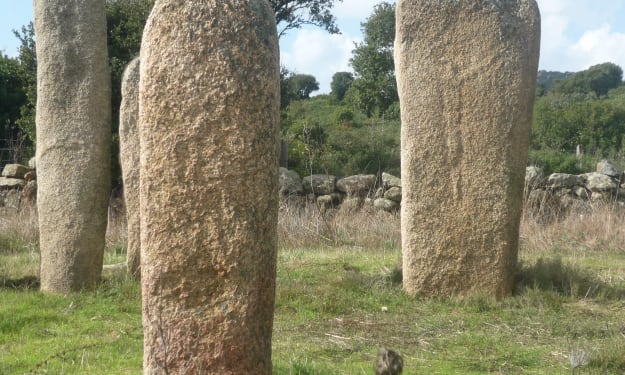The Barn In Orient Point
Surprises Can Be Anywhere, Especially In Old Barns

My kids and I lived in an old farmhouse at the tip of the North Fork of Long Island in Orient Point through most of the late 1960s and 70s. The farmhouse had been part of a large working farm, the land later sold off to a developer who never developed it. I ended up with about two acres consisting of the main house, a large old barn behind which the locals informed me were the old slave quarters. Yes, farmers on Long Island had once owned slaves to work their bountiful farms. The slave quarters had nothing left but three wooden shacks, no visible amenities or even remnants of a fireplace to warm a human being in the fierce freezing winds of winter blowing off Long Island Sound and Peconic Bay. I couldn’t imagine the suffering of those days.
My kids loved the slave quarters and the old barn, playing inside and around them for days at a time, making up games, building forts from old materials, playing hide and go seek with a boy down the road named Pond. As children, they had no idea what the back area had been built for. In summer they talked to me about a little girl who kept coming to play with them. She was about four years old, younger than them, and said she lived on a farm in the area and her name was Fannie Webb. For weeks they would go out and play with her, coming back with stories of what they did, games they played, the funny dress Fanny wore. I never saw the little girl even though I often suggested they bring her in for snacks or hot chocolate.
The barn had stables to house farm animals in winter, a loft for hay, room for tools, equipment storage, and a workshop. Everything was kept dry under its newer tin roof and it was beautiful in its large rustic, weather-beaten wooden splendor.
One day I answered a knock at my door, a man asking if he could examine my barn. He had just noticed it as he left the New London Ferry across the street. When he identified himself as being from the Suffolk County Historical Society, I agreed. After spending time inspecting the barn and its construction, he knocked at the house door again. Obviously excited, he opined it was one of the oldest barns in Suffolk County, possibly even the oldest. It was a rare find and he was happy to have spotted it.
I was curious about what made the barn so old. He was sso pleased to show me, we went back to the barn and inside, he pointed to the roof and rafters, explaining they were hand hewn into shape. They were held together mostly by carved wooden pegs with a few blacksmith forge shaped iron spikes. He thought the construction might date to the late 1600s. Back outside, he pointed to the double doors that opened to the root cellar underneath the barn. “I’d like to explore your root cellar if you don’t mind my coming out again sometime. I don’t have time now.” I assured him he was welcome any time.
I soon forgot about the barn and the man from the Historical Society. I was busy practicing law in my small firm and taking care of the kids. Then one Friday, a summer day somewhere around 1970, my beau, Eugene, showed up from Manhattan with a new friend. Chick was tall and robust, long reddish hair and beard, jeans, sandals and a pressed white shirt. An acolyte of the recently deceased Meher Baba, self-proclaimed living Avatar of God, Chick was on a mission to continue spreading Meher Baba’s message. The Avatar had been only one of the many Indian gurus coming into prominence at that time, the Beatles making meditation all the rage after their stay in India with Maharishi Mahesh Yogi. Transcendental meditation was popular and everyone who was anyone now followed one of the many gurus.
Eugene had spent years in India and was delighted with his new friend, eager to talk about mysticism, yoga and meditation. We set Chick up in one of the guest rooms and spent the evening, once the kids were asleep, smoking a little weed while enjoying his stories of trips around the world with the Avatar.
Early the next morning we were all sitting at the huge kitchen table having breakfast when Chick mentioned spirits spoke to him during meditation and last night one had spoken about the farm. As a gift from the spirit, he was going to show us something about the farm we did not know. We were to follow him, and to bring a flashlight.
At the time, he had only been on the farm the night before and that morning. I shrugged, why not? It would be interesting to see what he had discovered in that short time. Eugene and I followed behind him as he made straight to the barn, kids trailing. He went to the old barn basement ddoubledoors and began to struggle to open them. Eugene had to help, they had not been used in ages and had rusted the old lock and hasp together. I had left it that way because I did not want the kids down there roaming around. It was an old root cellar used for storage winters and I had not fully checked it out. I had no idea what dangerous things could have been left in a corner.
Chick went down the stairs, we all followed. At the bottom, he took the flash from Eugene and turned to his right, shining the light on the wall.
“Yes, this is it.” He said with a pleased and surprised look. “Come see.”
We walked next to him as he shone the light in front of him. Embedded in the cement and rock wall was a large tombstone. It was elegantly carved, a weeping willow tree over a casket. The name engraved was Fanny Webb with a little poem about the willow weeping for her. Her date of birth was in the 1820s with her date of death about four years later in the winter.
It was difficult in those days to bury those who died in the winter because the ground was frozen solid. The bodies would not keep inside the houses, and it was not proper to put them in an ice house where food was stored, or to leave them outside where predators might attack them when desperate for sustenance. The solution was usually to find a place to dig a hole in a protected spot below the permafrost, insert the body and casket and place a tombstone to mark the grave. The family root cellar was the obvious place. Later, if the family wanted, they could also place a gravestone in the graveyard with the rest of the family.
The kids touched the gravestone, especially where the name was carved. I looked at them both, they were both sad and shocked, but not so much as I might have thought. Neither one had much to say, and I found it surprising. Chick left the next day, we had a friend going back to the city who took him. We never saw him again and he had kept to his story about the spirit guiding him.
The kids never mentioned Fanny, and stayed out of the barn, confining their playground to the slave buildings. I did not have the heart to tell them about the ghosts that might have been lurking there.
This was one of those unsolved mysteries of life. That was fifty years ago. I often wonder if the barn is still standing and if any kids are around play with Fanny Webb.
About the Creator
Alice Donenfeld-Vernoux
Alice Donenfeld, entertainment attorney, TV producer, international TV distributor, former VP Marvel Comics & Executive VP of Filmation Studios. Now retired, three published novels on Amazon, and runs Baja Wordsmiths creative writing group.






Comments
There are no comments for this story
Be the first to respond and start the conversation.